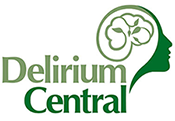Useful Websites for Clinicians
Useful Websites for Clinicians
These websites are intended for medical professionals. Patients and patient families seeking information on delirium should go to the pages entitled Family Members & Patients.
The information at these links was prepared by a variety of health care organizations and does not necessarily represent the official views of DeliriumCentral.org.
Age Friendly Hospital Systems
Age-Friendly Health Systems is an initiative of The John A. Hartford Foundation and the Institute for Healthcare Improvement (IHI), in partnership with the American Hospital Association (AHA) and the Catholic Health Association of the United States (CHA), designing Age-Friendly Health Systems to meet this challenge head on.
Age-Friendly Health Systems aim to:
- Follow an essential set of evidence-based practices;
- Cause no harm; and
- Align with What Matters to the older adult and their family caregivers.
American Delirium Society (ADS)
The goals of the American Delirium Society are to foster research, education, quality improvement, advocacy & implementation science to minimize the impact of delirium on short- and long-term health and well-being of patients.
American Geriatrics Society (AGS)
The American Geriatrics Society (AGS) is a not-for-profit organization of over 6,000 health professionals devoted to improving the health, independence and quality of life of all older people. The Society provides leadership to healthcare professionals, policy makers and the public by implementing and advocating for programs in patient care, research, professional and public education, and public policy. AGS provides resources related to inappropriate medications for seniors (Beers criteria), delirium, and national conferences.
American Journal of Health: Clinical Practice Guidelines for the Sustained Use of Sedatives and Analgesics in the Critically Ill Adult
Published in the American Journal of Health-System Pharmacy (Volume 59, Jan 15, 2002), provides clinical practice guidelines for the sustained use of sedatives and analgesics in the critically ill adult.
American Psychiatric Association (APA) Practice Guideline for Delirium
This practice guideline, developed by the APA in 1999, provides an overview to approaches for delirium as of 1999.
Australian Clinical Practice Guidelines for Delirium Management and Delirium Care Pathways
This is a 121 page guideline and partner document developed specifically for the Australian health care environment by the Clinical Epidemiology and Health Service Evaluation Unit, Melbourne Health in collaboration with the Delirium Clinical Guidelines Expert Working Group. The first set of national (Australian) clinical practice guidelines for the management of delirium in older people. (2006)
Delirium Reduction Initiative at University of California San Francisco Medical Center
The UCSF Medical Center is implementing an interdisciplinary delirium care pathway with the goal of reducing delirium on adult acute and transitional care units. This website contains educational resources on delirium screening, diagnosis and treatment as well as clinical information about their delirium reduction program.
Gerontological Advanced Practice Nurses Association (GAPNA)
The Gerontological Advanced Practice Nurses Association (GAPNA) is dedicated to the clinical care of older adults across diverse care settings. GAPNA membership provides opportunities for education, research, and advocacy for older adult care. This website provides many resources related to geriatrics and nursing, with specific resources in delirium and acute care.
National Cancer Institute – Delirium for Health Professionals
The information contained on the website from NCI discusses the prevalence of delirium in elderly patients with comorbid diagnoses of cancer. The content of the site includes definitions, epidemiology, and etiology of delirium, information on the impact of delirium on patient, family, and healthcare personnel, diagnosis and monitoring of delirious patients, and disease management.
National Guidelines for Seniors’ Mental Health: The assessment and treatment of delirium
The Canadian Coalition for Seniors’ Mental Health facilitated the development of this 78 page document. Clinical practice guidelines to improve the assessment, treatment, management and prevention of key mental health issues for seniors, written by interdisciplinary teams of health care professionals.
NICE Guidelines for Delirium
Clinical Guidelines for Delirium published by the NHS National Institute for Health and Clinical Excellence. The recommendations in the NICE guideline cover the care of adults (18 and over) with, or at risk of, delirium in hospitals and in long-term residential care or a nursing homes. The guidelines describe methods of preventing, identifying, diagnosing and managing delirium.
Optimal Perioperative Management of the Geriatric Patient: Best Practice Guidelines from ACS NSQIP/American Geriatrics Society
Best practice guidelines to prevent and treat postoperative delirium in older patients, developed in collaboration by the American College of Surgeons and American Geriatrics Society.
Outcomes after Critical Illness and Surgery Group, Johns Hopkins Medicine
Outcomes After Critical Illness and Surgery (OACIS) is a multidisciplinary clinical and research group focused on understanding and improving patient outcomes after critical illness and surgery. OACIS activities include clinical quality improvement projects and research focused on longitudinal, long-term patient outcomes assessments, both locally and nationally, with evaluation of physical, cognitive, and mental health outcomes.
Registered Nurse’s Association: Screening for delirium, dementia, and depression in older adults
This is a 2016 document from the Registered Nurses Association of Ontario, which includes nursing best practice guideline for screening of delirium, depression, and dementia in older adults.
VA Systematic Review on Delirium
Greer N, Rossom R, Anderson P, MacDonald R, Tacklind J, Rutks I, Wilt TJ. Delirium: Screening, Prevention, and Diagnosis – A Systematic Review of the Evidence.
Vanderbilt ICU Delirium and Cognitive Impairment Study Group
The Critical Illness, Brain Dysfunction, and Survivorship (CIBS) Center, developed by Vanderbilt University Medical Center, Veterans Affairs TN Valley Geriatric Research Education, and Clinical Center (GRECC), provides information on delirium in the intensive care setting. Also included is an online training manual for the Confusion Assessment Method for the ICU (CAM-ICU), a delirium monitoring instrument for ICU patients.






